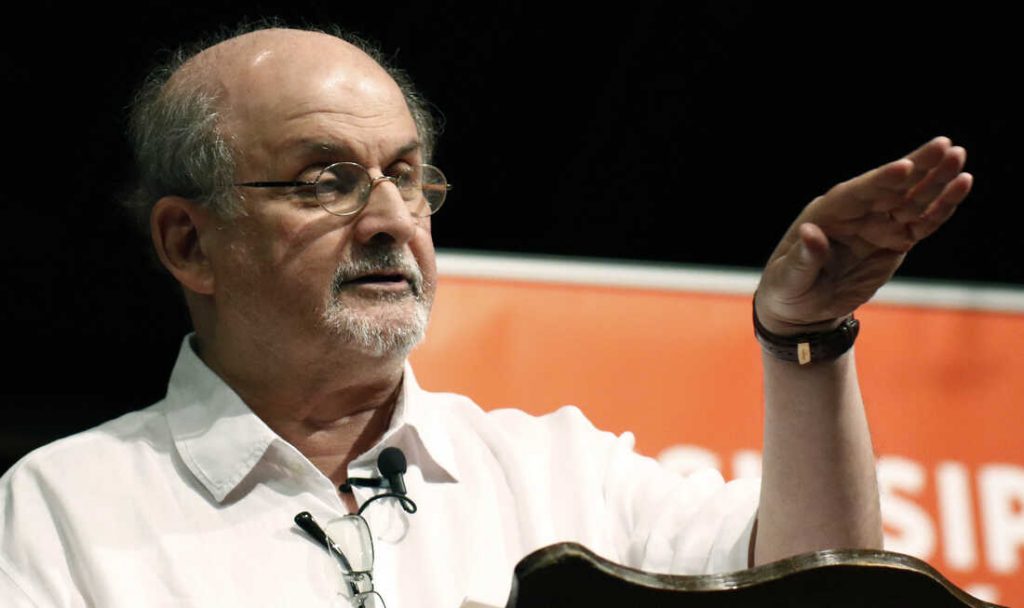Salman Rushdie had once said – Respect for religion has become a code phrase meaning ‘fear of religion.’ Religions, like all other ideas, deserve criticism, satire and, yes, our fearless disrespect.
In a world where religious fanaticism seems to be taking over societies across the globe, a public message of disrespect and satire requires immense courage. Rushdie who was brutally attacked with a knife on stage at a public function has not only survived but has now been taken off ventilator support. This proves the 75 year old author has tremendous mental strength which helped him overcome the wounds from the attack.
After Rushdie was taken off ventilator, his son Zafar Rushdie has said his father, in spite of the imminent danger still retains his ‘defiant and feisty sense of humour.’ Rushdie suffered a damaged liver and severed nerves in an arm and an eye in the attack. His agent Andrew Wylie said he was likely to lose the damaged eye. His condition is stated to be still critical and he will have to remain in hospital for some more time to receive extensive medical treatment.
The attack on Sir Salman Rushdie has disturbed the sane world as it has become an indication of the terrible dangers posed by religious fanatics. The irony is that the attempt on his life was made when he was about to take part in a discussion in an auditorium in New York on how the US can provide a safe haven, an asylum, to those who make freedom of speech and expression an article of their faith. A 24 year old man, identified as Hadi Matar, with sympathies for extremist Shia causes and Iran’s Revolutionary Guard Corps, went up on stage and repeatedly stabbed the author.
Rushdie incurred the wrath of Ayatollah Ruhollah Khomeini, the spiritual head of Iran, in 1989 for his book, The Satanic Verses, and a fatwa was issued for assassinating him over perceived insults to Islam in the book. Rushdie had to go into hiding fearing his life. He was charged with showing disrespect to the founder of Islam through his references that were termed blasphemous. Various Iranian groups had placed a bounty of more than $3 million on the author’s head since more than three decades. Though much water has flown since then and the government in Iran has maintained a studied silence on the fatwa, it is yet to revoke it. That it has not changed its mind much becomes clear from the defence of the attack by a spokesman of Iran’s Foreign Ministry, Nasser Kannani. While denying Tehran was involved in the assault, he justified the stabbing in remarks that represented the Islamic Republic’s first public comments on the attack. Regarding the attack, he made it clear that Iran does not consider anyone “deserving reproach, blame or even condemnation, except for (Rushdie) himself and his supporters.” His remarks show Iran remains as rigid against free thinking as it was during Ayatollah Khomeini’s time.
The dastardly attack has once again brought to the fore the question of how the right to dissent, which is the cornerstone of democracy and human development, can be defended. Writers and thinkers over the ages have been subjected to persecution, violence and even death for challenging orthodoxies. In recent times, India witnessed the killing of three such free thinkers who stood up against dogmatic acceptance of blind faith and superstition and cynical political use of distorted religion. The lives of journalist Gauri Lankesh, physician Narendra Dabholkar and scholar MM Kalburgi were snuffed out by assassins driven by intolerance, superstitious beliefs and skewed religious doctrines.
It is a matter of great relief that Rushdie is recovering and answering questions of the investigators. His ability to laugh at this stage raises hope that he will soon be able to wield his pen which may become more fiery than before. Salman Rushdie has shown umpteenth times he cannot be cowed down.
